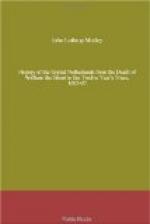It needed but a brief deliberation at the court of the archdukes to bring about the desired arrangement. The desire for an armistice, especially for a cessation of hostilities by sea, had been marvellously stimulated by an event to be narrated in the next chapter. Meantime, more than the first three months of the year had been passed in these secret preliminary transactions, and so softly had the stealthy friar sped to and fro between Brussels and the Hague, that when at last the armistice was announced it broke forth like a sudden flash of fine weather in the midst of a raging storm. No one at the archduke’s court knew of the mysterious negotiations save the monk himself, Spinola, Richardot, Verreycken, the chief auditor, and one or two others. The great Belgian nobles, from whom everything had been concealed, were very wroth, but the Belgian public was as much delighted as amazed at the prospects of peace. In the United Provinces opinions were conflicting, but doubtless joy and confidence were the prevailing emotions.
Towards the middle of April the armistice was publicly announced. It was to last for eight months from the 4th of May. During this period no citadels were to be besieged, no camps brought near a city, no new fortifications built, and all troops were to be kept carefully within walls. Meantime commissioners were to be appointed by the archdukes to confer with an equal number of deputies of the United Provinces for peace or for a truce of ten, fifteen, or twenty years, on the express ground that the archdukes regarded the United Provinces as free countries, over which their Highnesses pretended to no authority.
The armistice on land was absolute. On sea, hostilities were to cease in the German Ocean and in the channel between England and France, while it was also provided that the Netherland fleet should, within a certain period, be recalled from the Spanish coast.
A day of public fast, humiliation, thanksgiving, and prayer was ordered throughout the republic for the 9th of May, in order to propitiate the favour of Heaven on the great work to be undertaken; and, as a further precaution, Prince Maurice ordered all garrisons in the strong places to be doubled, lest the slippery enemy should take advantage of too much confidence reposed in his good faith. The preachers throughout the commonwealth, each according to his individual bias, improved the occasion by denouncing the Spaniard from their pulpits and inflaming the popular hatred against the ancient enemy, or by dilating on the blessings of peace and the horrors of war. The peace party and the war party, the believers in Barneveld and the especial adherents of Prince Maurice, seemed to divide the land in nearly equal portions.




